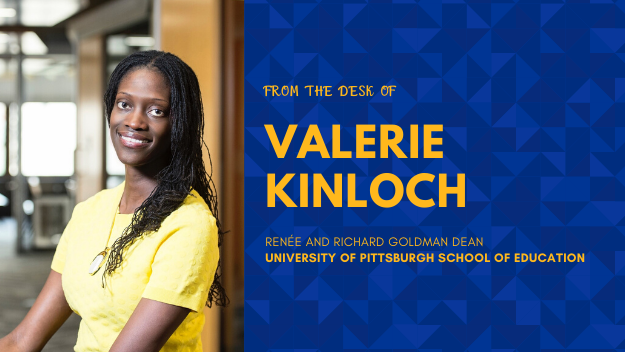From the Desk of the Dean - March 18, 2021
In Witness, Solidarity, and Invitation
Dear Members of our School of Education Community,
In the immediate aftermath of horrific femicidal violence against Asian womxn and drawn from the brutal intimacies of imperialism and colonialism, we write to witness, share, and encourage.
We have come to reconsider the use of “statements” to respond to eruptions of stark state and state-citizen violence that articulate across long, enshrined patterns of white male supremacist, colonial violence. Instead, we offer a witnessing to the abundant, rich lives taken. In the tradition of saying the names of all those whose lives were cut short, we say the names of those we know with as much accuracy as possible, as of this writing: Xiaojie Tan; Daoyou Feng; Delaina Ashley Yaun; Paul Andre Michels. The ongoing grief exceeds words.
We neither write on behalf of any group of people nor ask anyone to speak on behalf of any group of people. We write from our respective responsibilities to the shared work of freedom. In this spirit, we invite an initial framework for deeply considering the long durée of U.S. and global imperial violence against Asian womxn. As with any crisis, there are material resources that can be shared through mutual aid networks. Yet we turn to collective study to begin or to continue to make sense of these femicides. There are no “how-to” guides, toolkits, or best practices to respond without resulting in a reductivism to the fullness and complexity of life, humanity, and freedom struggle. To do anti-imperialist and anti-femicidal work, we invite all of us in the School of Education community into study.
Collective study is a work of commitment. Thus, we offer, below, the names of some authors and texts in an effort to deepen our commitments to the work of freedom. As you take up this invitation, we encourage you to consider the complex coordinates of power across some of the following structures, systems, and sites: labor, sex work, sexual violence, imperialism and colonialism, the “model minority stereotype” weapon, male supremacy, state documentation, migration, ethnonationalism, war, anti-Asian violences, and more. We also encourage you to join people in existing study work being undertaken.
To begin, please join our School’s Center for Urban Education (CUE) Lunch and Learn on Thursday, March 25, from 12-1:30pm. We will be joined by scholar-activist Connie Wun and Sabina Vaught for an important session on, “Scholarly Work and Organizing at the Intersections.”
Just this past Monday, our School of Education announced the formation of “Sister Circle” as one way for Womxn of Color students to engage in collective study, healing practices, and feminist organizing. This student-led initiative is open to all students who identify as womxn (gender conforming, non-conforming, and transgender) and who identify as Black, Indigenous, Asian, Latinx, and People of Color.
As our School moves forward in solidarities, we caution against the “hate crime” framework for a number of reasons: 1) It individualizes the perpetration; 2) It draws on state punishment and carceral apparatuses to correct or remedy state-promoted violences, thereby entrenching them; and 3) It fails to account for the sources of violence against Asian womxn in global imperialism and male/white supremacy.
In grief, solidarity, and invitation,
Sabina, Elon, & Valerie
Dr. Sabina Vaught is Professor and Department Chair of Teaching, Learning, and Leading
Dr. T. Elon Dancy II is Helen S. Faison Endowed Professor in Urban Education, Associate Dean for Equity and Justice, and Executive Director of the Center for Urban Education
Dr. Valerie Kinloch is the Renée and Richard Goldman Dean of our School of Education and Professor
A very initial list of authors and texts to study:
Please share authors, texts, websites, and other resources with one another.
Authors:
Grace Lee Boggs, Yuri Kochiyama, Ocean Vuong, Jodi Kim, Diane Fujino, Vijay Prashad, Stacey Lee, Bic Ngo, Cindy I-Fen Cheng, Leigh Patel, Yen Le Espiritu, Laura Pulido, Edward Said
Texts:
Dylan Rodriguez, Suspended Apocalypse: White Supremacy, Genocide, and the Filipino Condition
Deborah Thomas, Political Life in the Wake of the Plantation: Sovereignty, Witnessing, Repair
Audra Simpson, “The state is a man” and Mohawk Interruptus: Political Life Across the Borders of Settler States
Sonia Shah (Ed.), Dragon Ladies: Asian American Feminists Breathe Fire
Fred Ho and Bill Mullen (Eds.), Afro Asia: Revolutionary Political and Cultural Connections between African Americans and Asian Americans (politicaleducation.org)
Websites:
Asian American Feminist Collective: https://www.asianamfeminism.org/
I’m Ready Movement: https://www.imreadymovement.org/
Incite!: https://incite-national.org
“Hai Bà Trưng” by Tien Pham

from her instagram page:
ph.amm
For women’s history month, I’m highlighting the Trưng sisters, two Vietnamese warrior princesses who continue to inspire people today.
Vietnamese people were suppressed and exploited under the Chinese regime. Land was stolen and unfair taxes were enforced, there was a large divide between the nobles and peasants. Because of their background as daughters of a general, they grew up studying arts, literature and martial arts.
The two Trưng sisters united their people and led a rebellion of mostly women because of their strong desire for justice, especially justice for their father and husband (who were executed and killed) and a whole lotta love for their country and their people.
You can purchase the artist’s work here: https://www.pham.studio/shop/p/haibatrung

